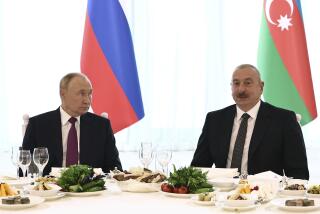Heydar A. Aliyev, 80; Ex-President of Azerbaijan Was Known for Adaptability
- Share via
BAKU, Azerbaijan — Former President Heydar A. Aliyev, a onetime Communist Party boss who emerged from forced retirement to exercise authoritarian rule over Azerbaijan for a decade, died Friday. He was 80.
Aliyev died in a clinic in Cleveland, where he had been undergoing treatment for congestive heart failure and kidney problems since August.
The cause of death was not announced. Despite Aliyev’s background as a KGB general and Soviet Politburo member, the U.S. government viewed him favorably as a secular pro-Western leader governing a moderate Muslim state of growing importance as an oil exporter. Washington also pushed him to permit greater democracy -- pressure that he largely deflected.
After the Sept. 11 terrorist attacks, the Bush administration viewed Aliyev as an ally in the fight against terrorism. Aliyev sent 150 soldiers to Iraq in August to join U.S.-led forces and cooperated with the U.S. military in antiterrorism exercises on the Caspian Sea.
Critics charged that Aliyev exploited the U.S. desire for stability in Azerbaijan, winning Western approval despite violations of democratic norms that included human rights violations and openly fraudulent elections.
The opposition called the appointment in August of his son, Ilham, as prime minister a step toward dynastic succession. The younger Aliyev went on to win the presidency in an October election.
Ilham Aliyev learned of his father’s death while attending a U.N. technology summit in Geneva. He reportedly was flying home to Baku late Friday and was making arrangements for the return of his father’s body.
The senior Aliyev was seen as a political chameleon.
His career was marked by extraordinary adaptability. He could be servile or ruthless: a Soviet for whom ethnicity was not supposed to matter or an Azerbaijani nation- alist; a committed enforcer of Communist diktats or a wily wheeler-dealer in the capitalist world of international oil.
Aliyev was born May 10, 1923, in Nakhichevan, an enclave of Azerbaijani territory separated from the Soviet republic and wedged between neighboring Armenia and Iran.
Aliyev graduated from Azerbaijan State University’s history department and, in the 1940s, entered Soviet dictator Josef Stalin’s NKVD secret service, a forerunner of the KGB.
Aliyev joined the Communist Party in 1945.
After rising through the security apparatus, he moved in 1969 from head of the KGB in Azerbaijan to chief of the republic’s Communist Party, a post he held until 1982.
During this period, Aliyev also drew attention for his obsequiousness toward Communist General Secretary Leonid I. Brezhnev, who became his patron. In a 1981 speech at a party congress, Aliyev praised Brezhnev 13 times in 15 minutes.
Aliyev’s claim to economic accomplishments and his closeness to Brezhnev won him a position as a nonvoting member of the ruling national Politburo in 1976. He was promoted in 1982 to full status under General Secretary Yuri Andropov, a rare honor for a non-Russian.
Aliyev served on the Politburo until President Mikhail S. Gorbachev forced him out in 1987, ostensibly for health reasons. Soviet media later attacked Aliyev for alleged corruption, implying that this together with lack of enthusiasm for Gorbachev’s reforms were the real reasons for his dismissal.
Aliyev’s fall from the Politburo appeared to mark the end of his political life. He returned in 1990 to his native Nakhichevan, powerless but with extensive contacts and skill at political infighting.
In July 1991, as pro-independence sentiment grew in Azerbaijan, Aliyev took a step toward returning to power by announcing his resignation from the Communist Party. He was elected head of Nakhichevan’s parliament two months later.
Azerbaijan gained independence with the breakup of the Soviet Union in late 1991, but a long-standing conflict with Armenia over control of the enclave of Nagorno-Karabakh, an area in Azerbaijan with an ethnic Armenian majority, worsened.
As war with Armenia raged, Azerbaijanis fighting for independence fell out among themselves. They also lacked experience governing.
Meanwhile, Aliyev was running Nakhichevan as a virtually independent entity, striking trade deals with Turkey and Iran that helped his region survive despite the conflict with Armenia.
By the spring of 1992, opinion polls in Baku, the nation’s capital, ranked Aliyev the politician considered most capable of extricating Azerbaijan from its escalating problems.
The next year, President Abulfez Elchibey’s government faced a revolt from a regional military commander. The weakened president invited Aliyev into a broad coalition aimed at defeating the revolt.
Aliyev flew to Baku on June 8, 1993. He became head of the parliament June 15, and three days later announced that he was assuming the powers of the presidency as Elchibey had fled the capital. On June 24, the parliament approved his powers.
In October of that year, Aliyev won a presidential election with an official tally of 98.8% of the ballots.
The main opposition Popular Front party boycotted the vote, arguing that its leader, the exiled Elchibey, was still the rightful president.
The human rights monitoring group Helsinki Watch denounced the balloting as undemocratic.
In 1994, Aliyev negotiated a cease-fire with Armenian forces. More than 35,000 people had died in six years of fighting.
Aliyev’s approach after that was to reject territorial concessions, offer a great deal of autonomy to the enclave, call for greater international involvement and refrain from reopening hostilities.
It was a formula that kept Azerbaijani nationalists under control while maintaining an uneasy peace, but it failed to achieve a final settlement to the conflict.
Aliyev carried on with the pro-Western stance set by the country’s first post-Soviet governments. He courted Western oil companies, which began pouring massive investment into Azerbaijan.
Last year, the country exported about $2 billion in oil and oil products.
More to Read
Sign up for Essential California
The most important California stories and recommendations in your inbox every morning.
You may occasionally receive promotional content from the Los Angeles Times.













